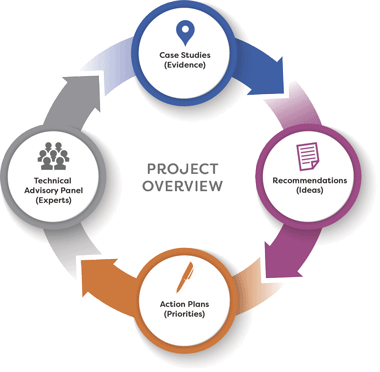From preserving large tracts of forested headwaters to enforcing riparian buffer ordinances, reviewing land development proposals, or maintaining stormwater infrastructure, over 800 municipalities play key roles in protecting water quality in the Delaware River Basin. Many different actors, from nonprofits to state agencies, assist municipalities in conservation, preservation, and restoration practices. However, many municipalities still struggle with the codification, enforcement, and implementation of these best practices.
In 2015, the William Penn Foundation awarded DVRPC a grant to work with a wide range of content experts and technical assistance providers to identify which types of technical assistance and support are most effective in helping municipalities protect and improve water quality across the Delaware River Watershed.
This stakeholder-based research project is organized into several overlapping parts. A one page overview of the project is available. An Advisory Panel of content experts in municipal technical assistance was created at the outset of the project. The DVRPC Project Team systematically interviewed them to create a base of understanding and solicit early recommendations.
Case Studies

Qualitative case studies are an increasingly popular tool for planners and their partners. The process of developing a case study allows researchers to capture recommendations, create more research questions, identify themes, and test theories and perceptions. Case studies can illustrate general recommendations or abstract ideas. Case studies also provide the "evidence" for a given recommendation. See this section for 15 case studies commissioned by DVRPC as part of this project.
Recommendations for Municipal Actions
Municipalities can use a variety of tools and create partnerships with nonprofits and citizens to improve the quantity and quality of their water resources. Such tools include:
- Laws and regulations, such as zoning and land development ordinances, riparian buffer ordinances, and stormwater ordinances; and enforcement of such ordinances
- Creation of and participation in land preservation programs
- Restoration activities, such as re-planting a riparian corridor or retrofitting municipal-owned stormwater basins
- Education, including public outreach, training for professional staff, and training for appointed citizens.
Through several phases of this stakeholder research project, MTAAP members and municipal officials provided ideas for municipal actions, which the DVRPC team synthesized into discrete recommendations and asked the MTAAP to prioritize.
Action Plan to Implement Recommendations
MTAAP members and municipal contacts provided ideas through a survey on how to enable or incentivize more municipalities to take actions that protect or improve water quality. Ideas were discussed, combined, and prioritized, resulting in an Action Plan organized into three categories - Innovative New Ideas, Expanding Existing Efforts, and Advocacy and Policy Campaigns.
Municipal Technical Assistance Advisory Panel
Municipal Technical Assistance Advisory Panel (MTAAP) members come from a variety of organizations, such as non-profit organizations; federal, state, regional, and local government agencies; land trusts; conservation districts; academic institutions; and utility authorities. MTAAP members participated in Stakeholder Interviews and MTAAP Meetings, provided input in selecting Case Studies, and participated in a Recommendation Prioritization Survey to inform the results of this two-year project.